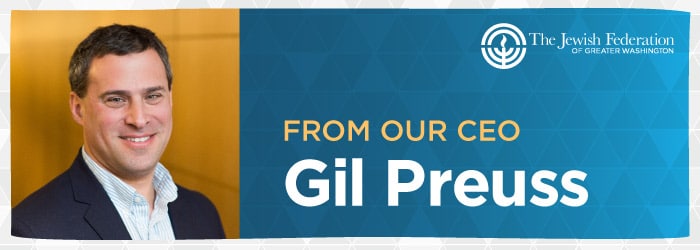-
02 July 2018

The topics of community and responsibility come up often in my conversations and have been at the forefront of our work in defining the role Federation can and should play in the Greater Washington area. This seems especially pertinent as we prepare to celebrate the 4th of July.
Growing up, July 4th was always a meaningful holiday for me. As a teenager living in Rockville, I cared about politics and American society, and was always attuned to the tensions and debates in this country. There were important issues that needed to be addressed that would shape the future of our country. I understood that it was my responsibility as a citizen to engage just as others with different opinions and visions engaged. Moreover, I always felt that we would collectively move over time to build a stronger America reflecting the hopes and dreams articulated (though not always actualized) at this country’s founding.
But these days, it feels different. As many others have noted, the divisions seem deeper. The differences in distinctive visions for American society seem to be more significant, while the potential for common resolution dwindles. This appears to be driven by several factors: we increasingly socialize only with people who agree with our own perspectives, and we read content that reaffirms our existing views. Increasingly, it also appears that we associate all positive attributes with those who agree with us and all negative attributes with those who hold opposing perspectives. The result is the increasing fraying of civic life.
I would like to suggest two very distinct and specific mechanisms to help us move forward as a Jewish community in this context. First is the need to engage in specific acts of connecting with caring for the other. For 3,500 years, we have built communities that are based on the core idea of the infinite value of each and every human life. We seek to take care of one another; speak up and out against wrongdoing; and remain true to the ideals and values that bond us as a people. The 20th century French philosopher Emmanuel Levinas used the idea of the “face of the other” as the ultimate metaphor for this Jewish sense of a personalized, commanding responsibility, writing, “The Other faces me and puts me in question and obliges me.” It is the specific acts of encountering and caring that tie people to each other, that change community and strengthen civic life. We witness this regularly here in Greater Washington, as we participate in opportunities like Good Deeds Day to strengthen our community and find ourselves changed in the process.
We know that our Jewish community is stronger because thousands of people take responsibility for the other. This not only strengthens individuals but increases our collective capacity to address current and future needs. The same is true for American society. As we take action to care for others, we build ties, community and society.
The second mechanism is very distinct yet rests on another great Jewish tradition – Machloket L’shem Shamayim (Mishna Avot 5:17) – conflict or debate for the sake of heaven. When a disagreement is for clarifying a truth rather than “winning an argument,” and where the relationship is preserved in the process, that is a debate for the sake of heaven. In Greater Washington, we are fortunate to have many incredible leaders committed to addressing some of the most critical challenges we face as a community and as a country. They dedicate their lives to building our community and country.
It is with this in mind that The Jewish Federation is embarking on a unique and innovative new partnership with the Shalom Hartman Institute of North America: an initiative set to elevate Jewish discourse and action in Greater Washington through learning, leadership and community engagement.
It feels appropriate to share this news on the eve of July 4th, because a significant component of this partnership will be a focus on civic engagement through a Jewish lens integrating Jewish traditions, debates and ideas with our current societal discussions with the expectation that arising from this will be a series of initiatives to strengthen our local civic culture in the future. You can learn more about this exciting venture here.
These ideas are not to negate other ways of engaging in shaping the future of our community and our community. Nevertheless, this work is critical in how we might put our 3,500 years of Jewish learning and tradition into practice in building community and strengthening civic life.
Wishing you a wonderful holiday,
Gil
